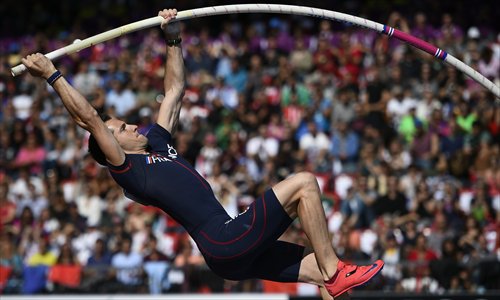HOME >> SPORTS
Track and field under the spotlight
Source:AFP Published: 2014-12-20 0:28:02
Doping cases beset athletics

France's Renaud Lavillenie competes in the men's pole vault final during the European Athletics Championships at the Letzigrund stadium in Zurich on August 16. Photo: CFP
Track and field goes into the New Year in turmoil amid claims of institutionalized doping, notably in Russia, after a season that saw little of Jamaican sprint star Usain Bolt in action.Before the negative drug-tainted rumors came to light, Frenchman Renaud Lavillenie set a new world record in the men's pole vault, breaking Sergey Bubka's long-standing mark of 6.15 meters by a centimeter, indoors in Donetsk in February.
And Bolt anchored Jamaica to gold in the 4x100 meters relay in an exceptional Commonwealth Games in Glasgow, although British middle-distance hero Mo Farah was a last-minute pullout as he focused his comeback from injury on the European Championships in Zurich.
Bolt also missed the inaugural International Association of Athletics Federations (IAAF) World Relays, a high-octane, top-drawer two-day competition held in the Bahamas in May that made for riveting viewing.
That followed the World Indoor Championships in Sopot, Poland, in which Bolt's teammate Shelly-Ann Fraser-Pryce won 60 meters gold in her indoor debut at the age of 27.
Lavillenie and New Zealand's unstoppable shot-putter Valerie Adams were rightly named the IAAF's World Athletes of the Year.
"There can't have been a better year than 2014 and now I have the acknowledgement of the athletics family," said 28-year-old Lavillenie, who is also the reigning Olympic champion.
Adams is on a run of 56 successive competition wins, but her winning the accolade is rare as field events are often muscled out by the "glamor" events such as sprinting.
There was controversy after American sprinter Justin Gatlin was initially named on the men's list.
The 32-year-old was in outstanding form all season, notably winning the 100 meters (9.77 seconds) and 200 meters (19.71 seconds) at the season-ending Brussels Diamond League, the former time a season's best with only four men having gone faster.
But some athletes protested that the 2004 Olympic 100 meters gold medalist and double sprint world champion in 2005 was not deserving of an award given the fact he served a 2006-10 doping ban.
The ugly head of doping then reared up in spectacular fashion after the broadcast of a German-made 60-minute documentary Secret Doping Dossier: How Russia produces its Winners, which was aired by German state broadcaster ARD.
The IAAF ethics commission has now launched an investigation into the claims of institutionalized doping, with the film claiming Russia was involved in widespread systematic doping of its athletes and pointing the finger at Russian athletics federation head Valentin Balakhnichev, who has since stepped down as his secondary role as IAAF treasurer.
The film also featured a list of 150 athletes who returned suspicious blood test results between 2006 and 2008, and which included three Britons, one of whom is high profile.
The allegations are based on claims made by former Russian 800 meters runner Iuliia Stepanova, who is banned until January for a doping violation, and her husband Vitali Stepanov, who worked for Russia's Anti-doping Agency between 2008 and 2011.
Russian officials have strongly denied the claims of state-backed doping made in the documentary. And the Russian athletics federation has said it is considering legal action.
The son of the IAAF's president Lamine Diack, Papa Massata Diack, has also stepped down from his role as a marketing consultant for the Monaco-based body after allegations of possible corruption linked to the attribution of the 2017 world athletics championships, which was handed to London ahead of Qatar.
Kenya under pressure
Arguably the highest profile doping casualty was Kenya's Rita Jeptoo, the world's current top female marathon runner who tested positive for the blood-boosting drug EPO during an out-of-competition anti-doping control.
Kenya has been under pressure to take action over doping after a string of positive tests in recent years.
But Jeptoo's positive test - making her the first big-name Kenyan athlete to have been caught - has stunned Kenya, whose distance runners are national heros and a major money spinner in the high-altitude Rift Valley region.
It was the East African giants Kenya, who topped the medals table at the Commonwealth Games with 23 in total, including 10 golds, 10 silvers and three bronzes.
Jamaica were second with 19 (10-3-6), followed by Australia (12; 8-1-3), England (27; 5-13-9) and Canada (17; 5-2-10), but Bolt raced only in the program-ending 4x100 meters relay.
Jamaica has one eye firmly on regaining full fitness for the 2015 World Championships in Beijing, the scene of his first Olympic treble gold showing and the start of his near-total domination of the world of sprinting.
Posted in: Feature, Track and field